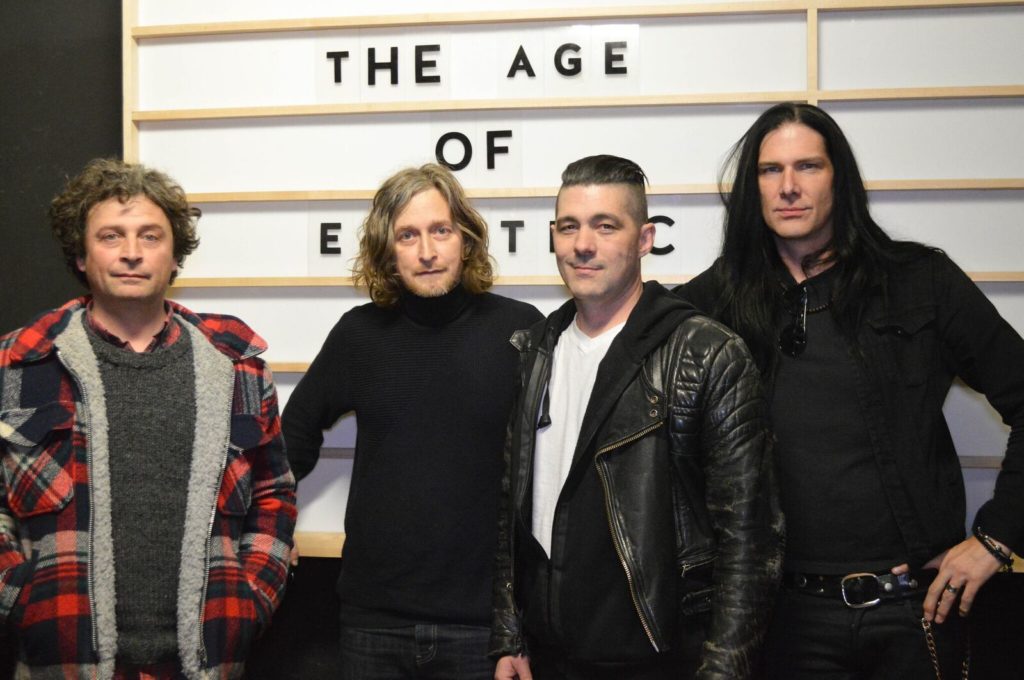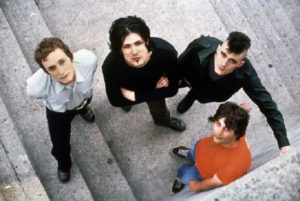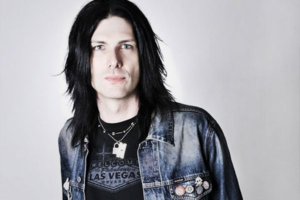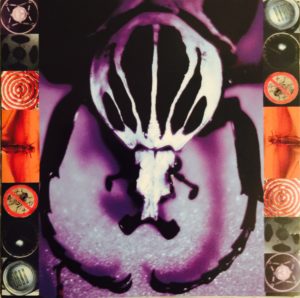
Like many of their contemporaries, Canadian alternative rock band The Age of Electric shuttered its operations at a time when the music industry was going through a primordial and cataclysmic series of changes which completely changed the dynamic of what it meant to be a touring and recording artists of some note.
Indeed, the band that had started in 1989 in Lanigan, Saskatchewan when good friends Todd Kerns and Kurt Dahle, who had been playing together in bands since 1986, brought in their respective younger brothers, John Kerns and Ryan Dahle, had begun splintering due to both internal and external pressures, going on hiatus in late 1998. A few years later, acts such as Econoline Crush, I Mother Earth, The Tea Party, Moist, and Big Sugar would also call it quits, with Our Lady Peace being one of the few to soldier on.
It is kind of odd then, at least to fans of that era and music industry observers as a whole, that while all those other bands have reformed over the past eight or nine years (I Mother Earth actually reforming twice, once in 2010 with singer Brian Byrne, and last year with original vocalist Edwin), the two sets of talented musical siblings only reconstituted their filial creative ties under the banner Age of Electric in late 2015 for what was, at the time, deemed to be a one-off reunion show.
Circumstances, and increasing demand, have essentially lead to a semi-permanent reunion of the group, which on Feb. 17, re-released it’s seminal 1997 hit album, Make a Pest a Pet, remastered and including a number of previously unreleased songs on a two-LP vinyl. At the same time, the band also launched an EP of new material called Pretty and is embarking on its first proper tour this spring – it’s first since opening for Our Lady Peace back in 1998.
According to Todd Kerns, who has spent the better part of the past seven years spanning the globe as the touring bassist and occasional vocalist for Slash Featuring Myles Kennedy and the Conspirators, Age of Electric actually had what one might call a soft break up.
“It was a very passive-aggressive Canadian kind of split in that we never really did say that we had broken up. I don’t remember ever putting those words together. And in a lot of ways, if a few other things had not happened, we probably would have done this five, 10 or even 15 years ago. I was busy in the States and Kurt was busy with his band The New Pornographers. A few of these things and others pushed us in different directions, but we were always in contact. Even to this day there is a sort of constant conversation stream on my phone involving a combination of some or all four of us. The thing is, Ryan and I were back writing songs together a few years later, just knocking ideas around again and a lot of those things started to form into what would become this newer music that we’re dealing with now,” Kerns said from his home in Las Vegas.
 “The idea of actually getting these four guys together and stamping the name Age of Electric on it was a whole other conversation. I would get these calls once or twice a year from a promoter asking if Age of Electric would be interested in doing something. We would be fascinated that people would still be saying the name, let alone wanting to book us. And in places like Calgary, where were left a pretty big mark, it was almost like every year someone was putting on a dinner for us and just said, ‘if you guys can come down, we’re ready.’ And if we didn’t make it, that was due to scheduling. I was busy as hell and Kurt was busy as hell. But one day in 2015 it just all came together. I remember putting it out there to the other guys and suddenly getting a resounding yes that it was possible. And even though there were a couple of hiccups along the way, and me being quite morbid sometimes, I was always anticipating it falling apart and the 11th hour, but it didn’t. And on Aug. 29, 2015 all four of us were on a stage for the first time in 17 years and it was great.”
“The idea of actually getting these four guys together and stamping the name Age of Electric on it was a whole other conversation. I would get these calls once or twice a year from a promoter asking if Age of Electric would be interested in doing something. We would be fascinated that people would still be saying the name, let alone wanting to book us. And in places like Calgary, where were left a pretty big mark, it was almost like every year someone was putting on a dinner for us and just said, ‘if you guys can come down, we’re ready.’ And if we didn’t make it, that was due to scheduling. I was busy as hell and Kurt was busy as hell. But one day in 2015 it just all came together. I remember putting it out there to the other guys and suddenly getting a resounding yes that it was possible. And even though there were a couple of hiccups along the way, and me being quite morbid sometimes, I was always anticipating it falling apart and the 11th hour, but it didn’t. And on Aug. 29, 2015 all four of us were on a stage for the first time in 17 years and it was great.”
And unsurprisingly, the show was a raucous hit, with both fans and band members enjoying the experience to the utmost.
“As I have said before and it’s a clichéd line, but the weirdest part of it was how not weird it was. We got into the rehearsal space together and at first it’s a little weird, but to look around and see those faces and those guys and playing those songs very quickly became the most normal thing ever. And since then, like most things, it creates its own momentum. At that time there was a break in the Slash tour and I was able to do the show and a couple others, but since Slash got back with Gun N Roses it opened up this portal of time for us to jump back in at a more serious level,” Kerns said.
“And in terms of doing the 20th anniversary release of Make A Pest A Pet was something we touched on in 2016 thinking that it was a crazy landmark to think that 20 years had gone by. Ryan still had the original 2-inch tapes hanging around so he broke them out and found these four other songs that we had recorded but not released, and the next thing we know we are actually putting this anniversary project together. And then on top of that we’ve got brand new material. It’s a weird little ‘lightning in a bottle’ moment for us, and we’re taking full advantage and having a great time.”
Like many of the other Canadian bands who made it big in the 1990s, the reformation of Age of Electric is not going to be the Kerns and Dahle brothers’ primary focus. It is now being folded, as best as possible, into the fabric of their already busy, vibrant and rewarding careers. But it is going to remain an important component for the foreseeable future.
“We all realize that the music industry as such, and the Canadian music industry even more so, is so much more compartmentalized if you want to make it your living and work regularly. I know I like to work 365 days a year, not six months of the year. So to me there is only so much we can do unless we plan on taking Age of Electric overseas or take it into the United States, the latter of which is a possibility since I live there and people have approached me about it,” Kerns said.
“In the meantime, I am not going to stop doing what I do, writing on my own and releasing my own music and I don’t think Ryan has any intention of doing that either. We all have so many other things going on. I guess the best way to describe it is that it used to be in order to keep moving forward it was like you wrote an album, you recorded an album, you released and album and then you toured the album – lather, rinse and repeat. Now it’s sort of like four guys with day jobs looking at each other for a pick-up game on the weekend. It takes a lot of the pressure away.
 “I think the Age of Electric, moving forward, will take advantage of scheduling that works and we will create and re-create our own momentum. And I can’t say we were being really smart and planned all of what’s happened recently. But we were writing songs and doing this and that with no goal in mind, but by chance it all came together. It was a controlled chance, but a chance nonetheless, so when it did all come together, we were ready. We had a good reason to do it and good momentum to keep pushing it forward.”
“I think the Age of Electric, moving forward, will take advantage of scheduling that works and we will create and re-create our own momentum. And I can’t say we were being really smart and planned all of what’s happened recently. But we were writing songs and doing this and that with no goal in mind, but by chance it all came together. It was a controlled chance, but a chance nonetheless, so when it did all come together, we were ready. We had a good reason to do it and good momentum to keep pushing it forward.”
Kerns is indeed incredibly busy, by his own choice. Besides his work with Slash, the Age of Electric Reunion, Kerns has released a number of solo albums, including the TKO project late last summer. (He’s also released an album in 2001 under the Static in Stereo banner, performed in the Las Vegas-based Sin City Sinners, and also released an album of Canadian rock cover songs alongside current Slash drummer Brent Fitz, called Toque.)
TKO is essentially a solo project, but the material was put together in close collaboration with long-time friend Reed Shimozawa of Zuckerbaby, and is kind of a compilation of material mined from songwriting sessions between the two over the past decade or more.
“We’d known each other since 1990, and around 2002 we started hanging around together more and we were literally sitting on his couch one day playing with a riff and coming up with some stuff. And he said we should go into the studio. I said sure, sometime that would be good. He said, let’s go right now and he picks up the phone and calls over to the studio. We drove over, got a drummer to come in on short notice and put down a song called Globally Delayed which is actually on the TKO record. And when I say we went into the studio, we recorded everything – the vocal, the guitar solos so by the end of the night we had a complete song, not just a nucleus,” Kerns said, explaining that over the years, when schedules permitted, the pair did this over and over again, often without any sort of notion as to how the song would turn out.
“We would go in there with nothing formed, just some scattered ideas. It was a real practice in songwriting, a real practice in recording. And we put ourselves in a mindset that we weren’t leaving the studio that day without having something. And the funny thing is, those ‘somethings’ ended up being stuff that I really feel is some of my best work, especially lyrically. I wanted to do something that was good work and had some sense of narrative. So I think those challenges and the process itself created its own fun and limitations and ended up being this really cool kind of garage record.
“And we had been sort of chipping away at it and last year I realized that I had a bit of a gap and that we’re in this sort of wacky chapter in the music industry there I can use the crowd funding idea thanks to the audience I have built through Slash and my own stuff. And it’s weird to use this term, but I am sort of thinking about my legacy here. We live in a time where everybody wishes they could sell way more records; hell, Paul McCartney wishes he could sell way more records. Of course there’s the financial considerations but for me it comes down to this: I am never going to stop, regardless of everything else. I am just going to keep making music. People keep saying that rock and roll is dead and how the record industry is dead, but it’s not as long as you figure out your own way to keep it alive.”
And there are rumblings that when Slash is finished with the current Gun N Roses reunion that he will reconvene Kennedy and the Conspirators at some point to record new music. Kerns said that it was both fun and fascinating to be at the sort of epicentre of what he himself calls “one of the biggest rock and roll reunions of our generation.”
“I was always hyper aware that there would be breaks, sometimes short ones, sometimes longer ones. Myles was always bouncing back and forth between Slash and Alter Bridge and that was normal. He never had any intention of leaving Alter Bridge. It wasn’t like back in 2010 Slash put together this lineup and we all went, ‘okay this is it. This is my thing now.’ It was always sort of a project idea. When Myles was available, we did it. Myles, in his own way, is as committed to the Slash thing as anyone can be. When Slash came to us a couple years ago now and said Guns was doing the Coachella thing and a couple of shows in Vegas, I know in my mind there was no f***ing way there’s just going to be three or four shows and that’s it. This is the biggest thing to happen to rock and roll in recent years. This thing’s going to go around the world a few times,” he said, adding that his full musical life outside of Slash meant he was going to be both busy and productive – even more so considering the elevated profile he’s had over the past seven years as a Conspirator has meant more interest in all his projects, including Age of Electric.
 “Having this extra big window right now just meant I had more of my own stuff to do. I had been the bass player for Slash, but I am a singer and songwriter first and the gap just opened up this awesome window for me. The first thing I sort of did was pull together the TKO solo project and then the Age of Electric reunion and this tour we’re doing later in the Spring. I also put together a solo band here in Vegas and we’re doing our thing and I also do solo acoustic shows all the time. So it’s been a really amazing chapter for me that I have been able to kind of open up this side of myself to a wider audience. I mean, there are people in Europe and South America who only think of me as the bass player for Slash and think this whole doing my own album thing is somehow new and fresh,” he said, adding that he has learned a lot from Slash and his dedication to his craft.
“Having this extra big window right now just meant I had more of my own stuff to do. I had been the bass player for Slash, but I am a singer and songwriter first and the gap just opened up this awesome window for me. The first thing I sort of did was pull together the TKO solo project and then the Age of Electric reunion and this tour we’re doing later in the Spring. I also put together a solo band here in Vegas and we’re doing our thing and I also do solo acoustic shows all the time. So it’s been a really amazing chapter for me that I have been able to kind of open up this side of myself to a wider audience. I mean, there are people in Europe and South America who only think of me as the bass player for Slash and think this whole doing my own album thing is somehow new and fresh,” he said, adding that he has learned a lot from Slash and his dedication to his craft.
“Listen, if it were up to Slash, we would never stop recording and playing. That’s the thing about him that I admire so much. The music comes first – making music is in his DNA and I am kind of the same way. If you make music, if you’re really doing this as your calling and your living, you’ve just got to find a way to make it and the rest of your life work. And even with all the changes, music has truly become global. I have people coming up to me in New Zealand wanting me to sign their Static in Stereo CD. Really? Or from my 2004 solo album. What’s really amazing about music is that these songs will all sort of be floating around in physical or digital form long after we’re gone, like a ghost of me still floating around on earth.
“I make music because that’s what I do. And I play music because that’s what I do. And I am just going to keep going and even I don’t know when I will stop. Right now, the four guys in Age of Electric are doing this because we love it and we want to do it. Going across the country in a couple of months is going to be surreal and playing to fans who haven’t seen us in 17 years and kids who were running around in diapers when we were last touring it’s going to be amazing. The coolest thing for us has been stepping out on stage and looking out at an audience that’s just smiling. It’s the weirdest thing in a lot of ways. I really don’t try to put too much weight on it because I know we’re not the f***ing Beatles. I know we’re just some band from Saskatchewan that was lucky enough and hard working enough to achieve a few things. But you look out at an audience that is really happy to be there and really enjoying seeing and hearing this band that meant something to them when they were younger. I never really lose the idea that this music means something to people. I have been lucky enough to be in a position where a kid comes up and says, ‘you’re the reason I picked up a guitar,’ which is really awesome because I remember feeling the same way.”
The Age of Electric’s spring tour of Canada begins March 24 at the Commodore Ballroom in Vancouver and wraps up April 15 in Ontario at the Oshawa Music Hall.
For more information on other dates, the new EP and the Make A Pest A Pet re-issue, visit http://www.theageofelectric.com.
- Jim Barber is a veteran award-winning journalist and author based in Napanee, ON, who has been writing about music and musicians for a quarter of a century. Besides his journalistic endeavours, he now works as a communications and marketing specialist. Contact him at jimbarberwritingservices@gmail.com.
